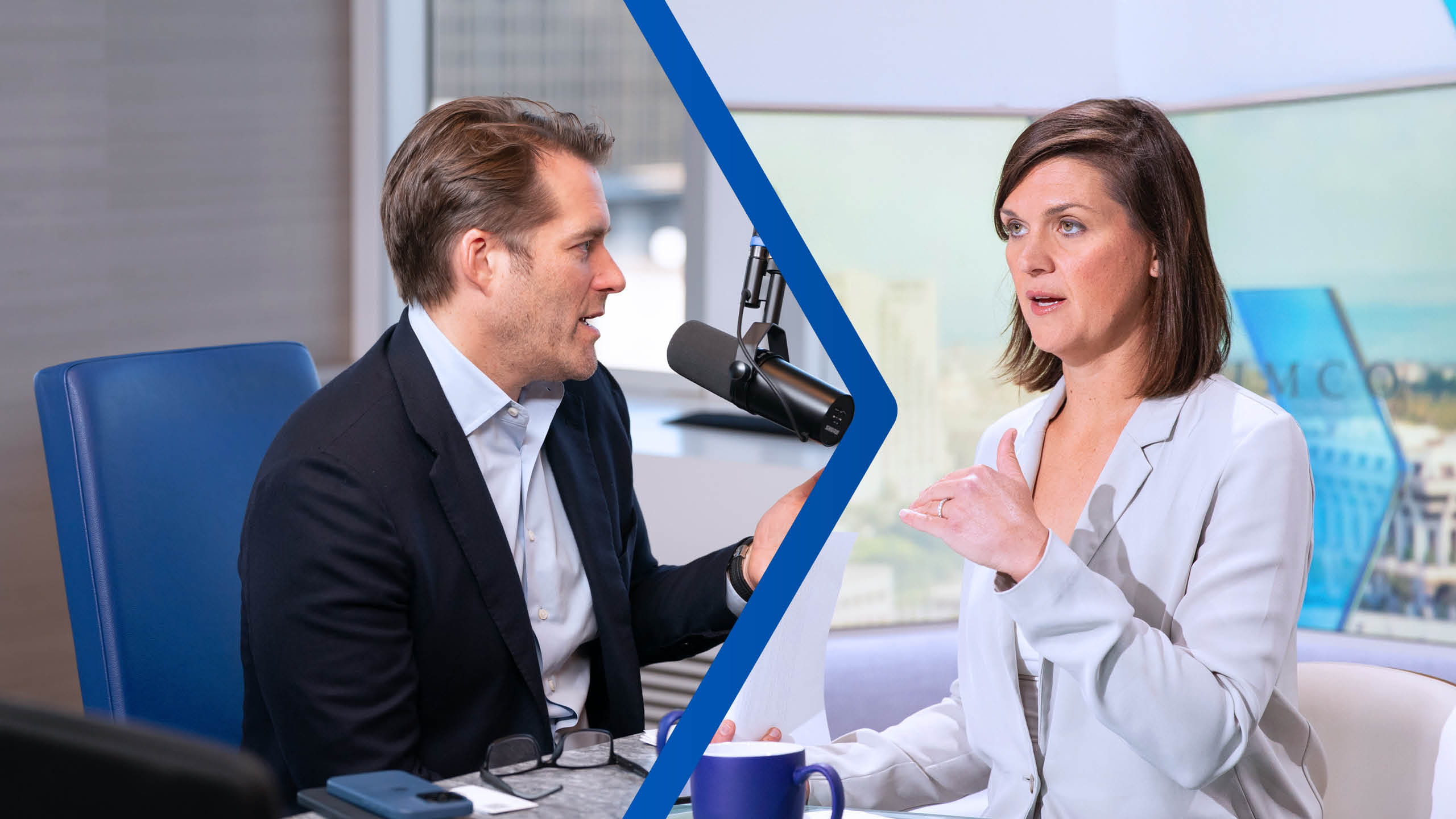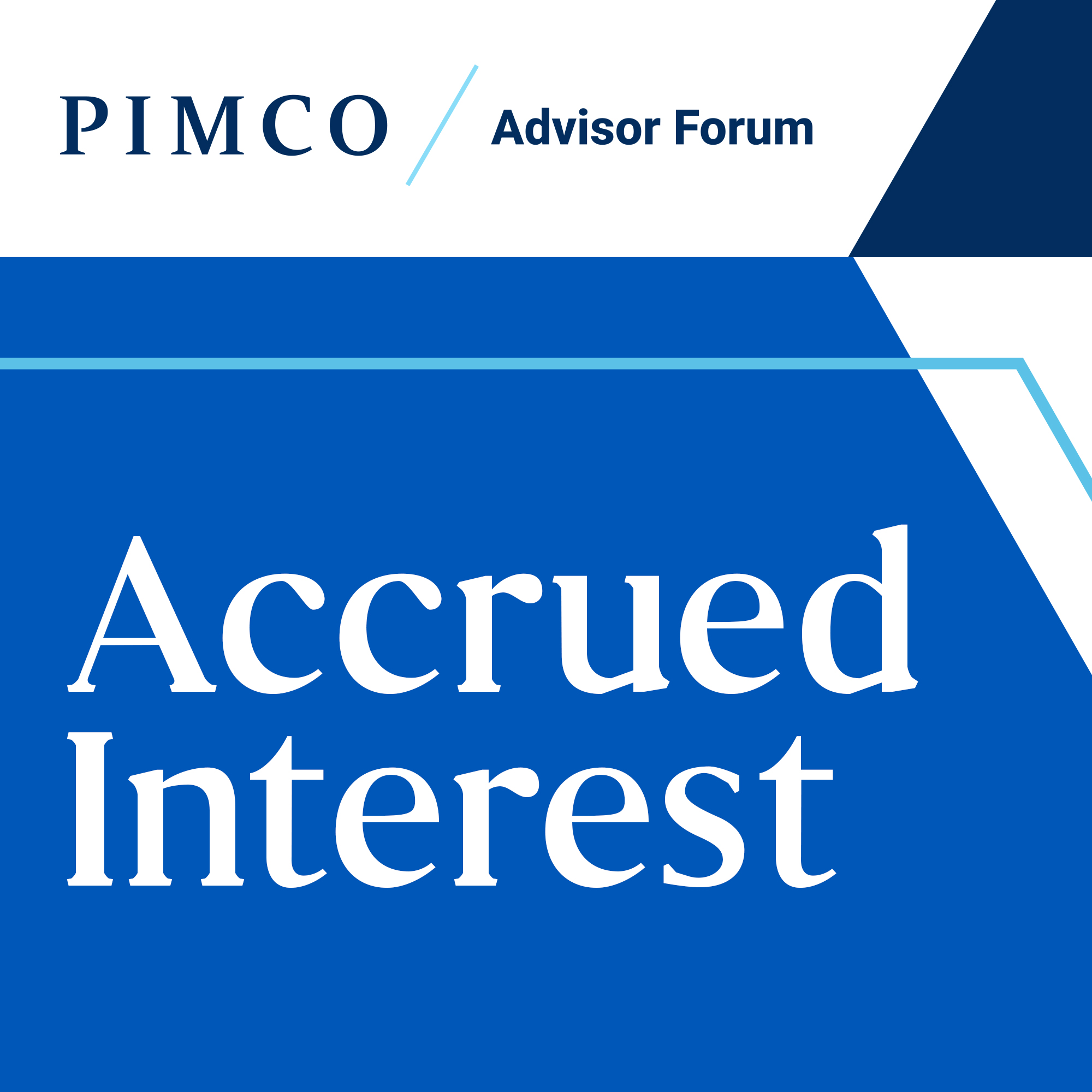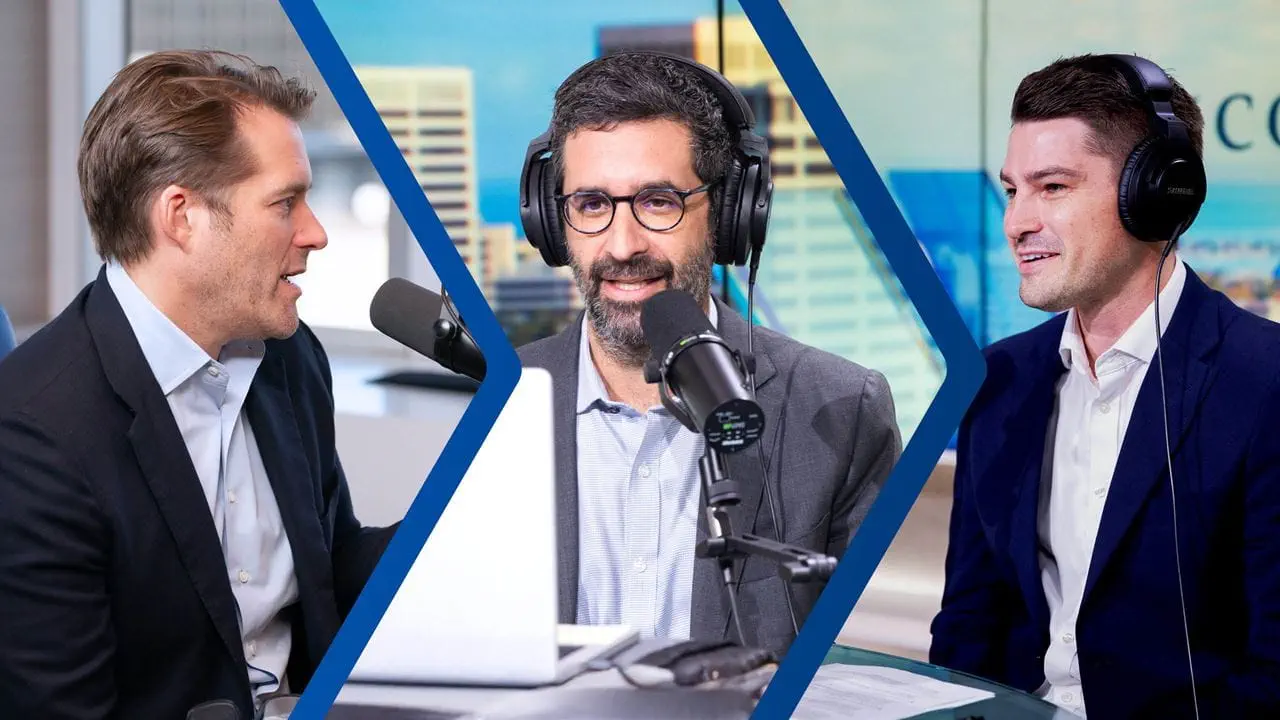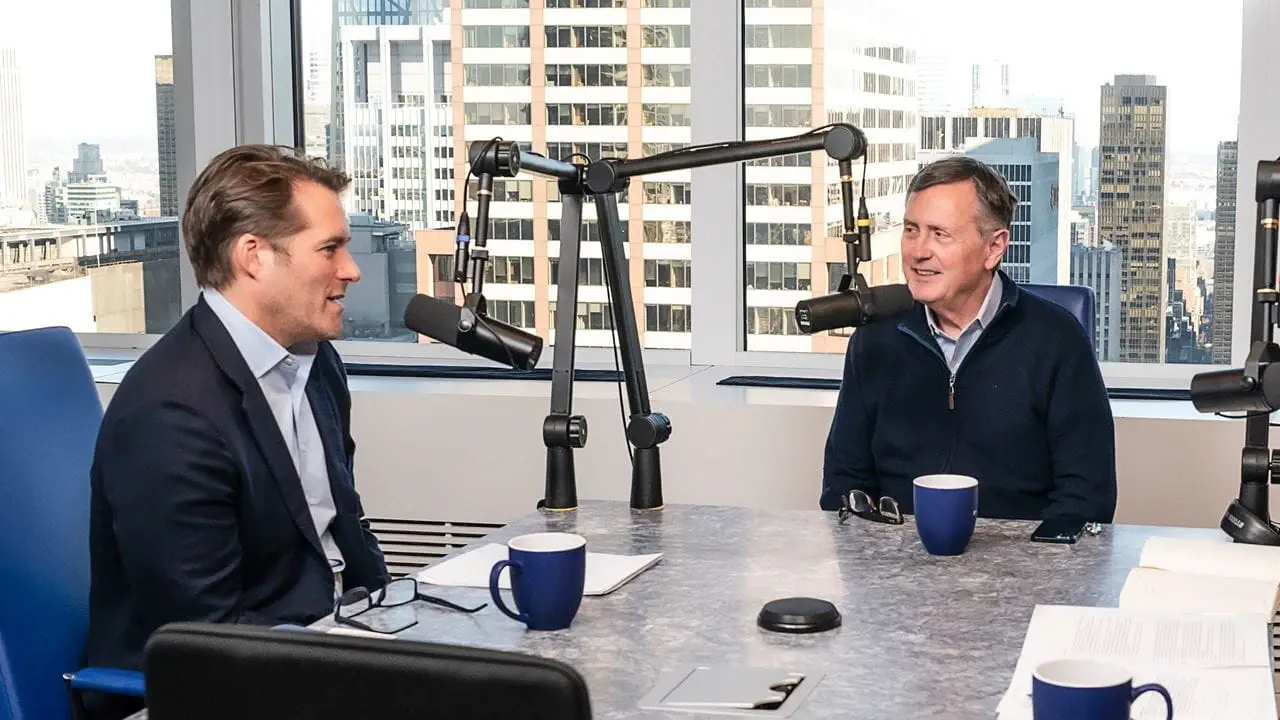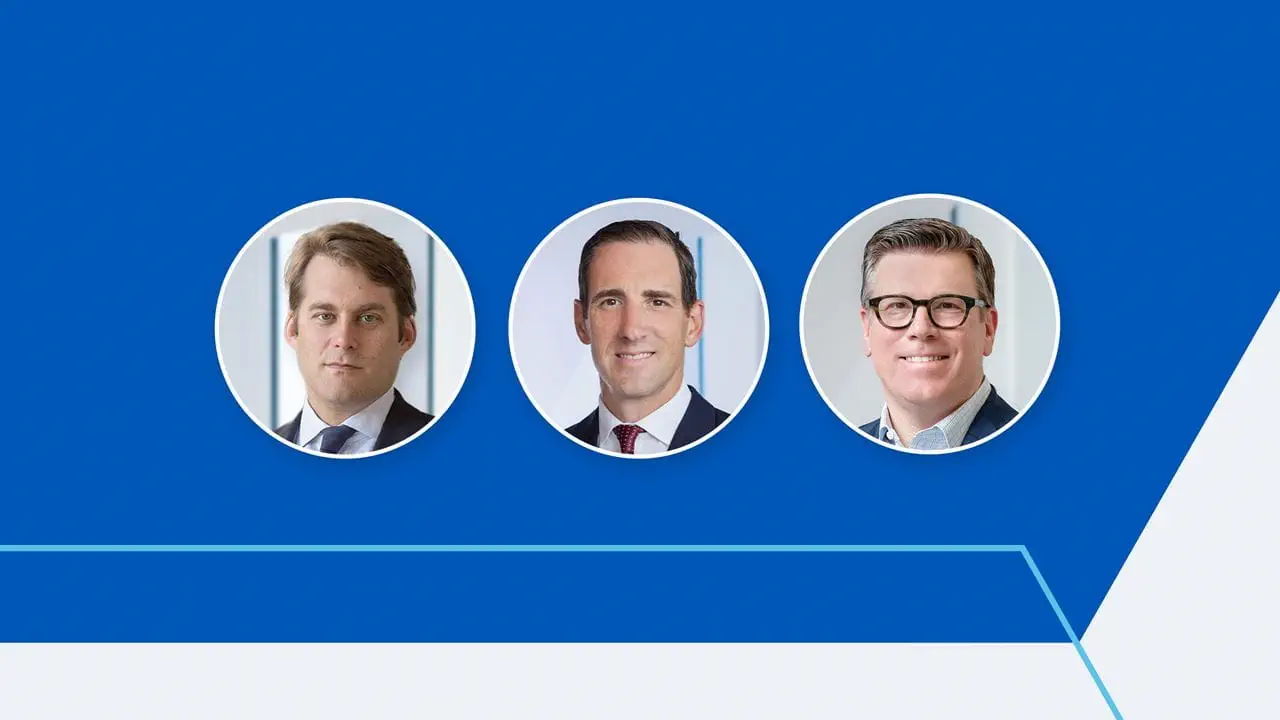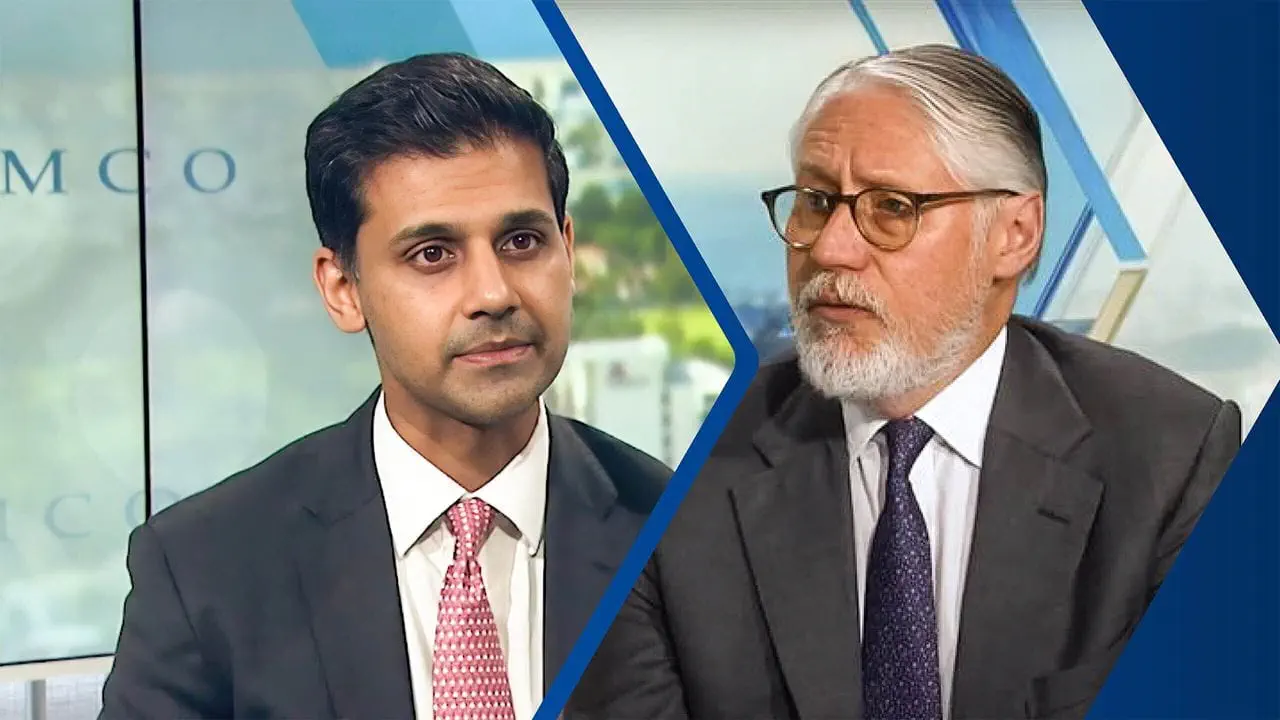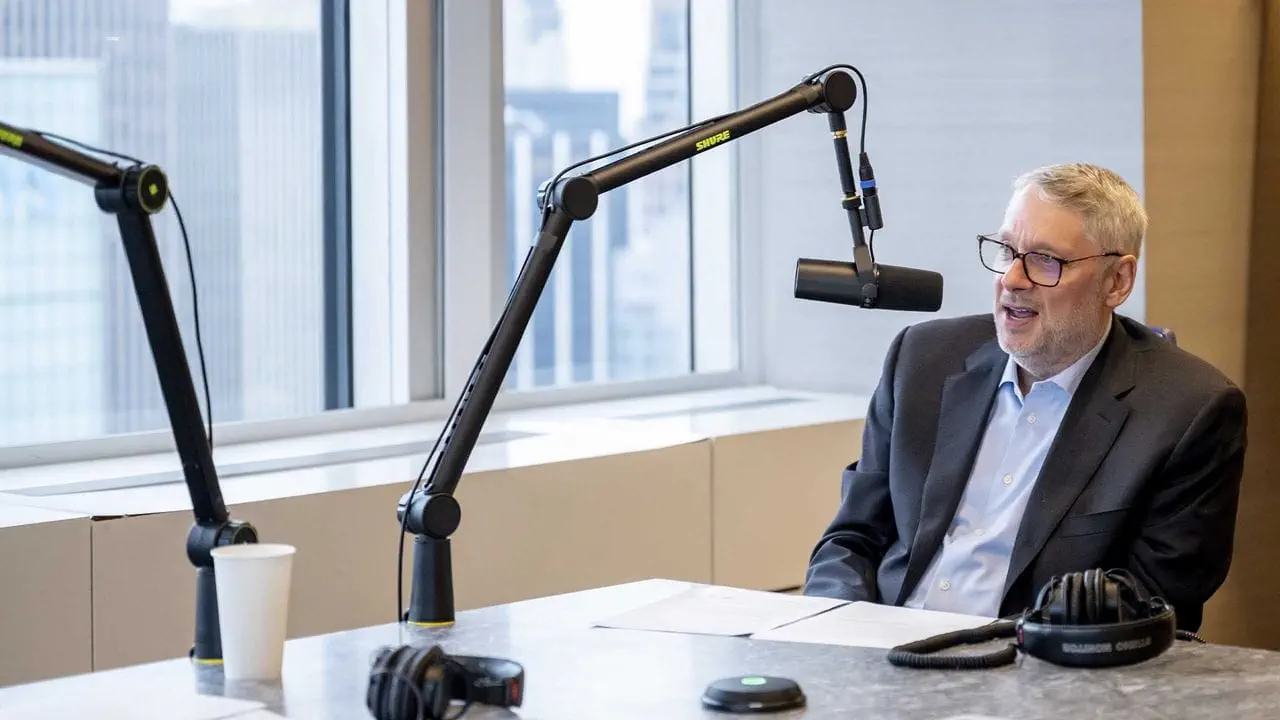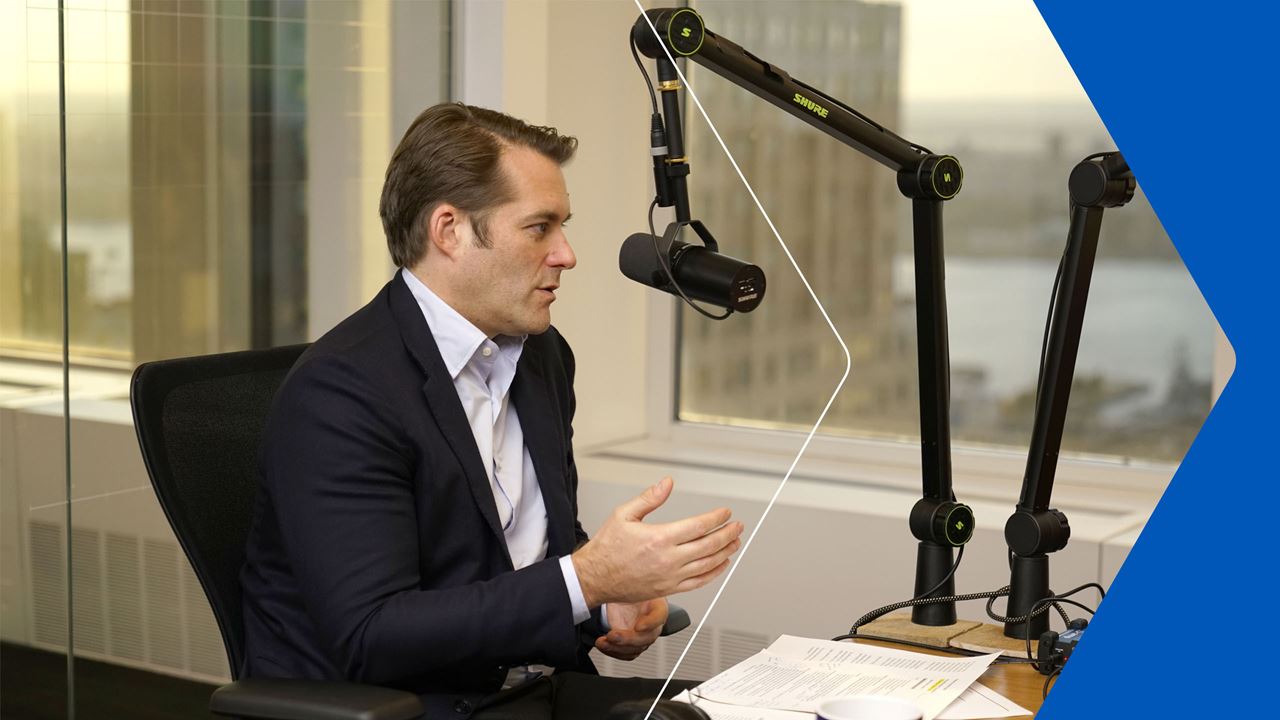Please stay tuned after the conclusion of the podcast for additional important information.
GREG HALL: Tariffs technology and transition. That's the title of Pimco's latest cyclical outlook, which we published October 1st. And also the subject of today's conversation. I’m your host Greg Hall. And today on Accrued Interest, really excited to have one of the authors of that piece with us Tiffany Wilding, who's a macro economist at PIMCO and runs the Cyclical forum process. Tiffany, thanks for joining us!
TIFFANY WILDING: Yeah, thanks for having me! It's great to be back!
GREG HALL: Yeah. We had you in April, right?
TIFFANY WILDING: I think it was right after Liberation Day, right after those tariffs were announced.
GREG HALL: It was that week. Everybody was running around, you know, trying to figure out what had just happened. I think we had you and Libby, on talking about the politics and the economics of that, right?
TIFFANY WILDING: Yeah, that's right. It feels like there, it's like a lifetime ago already, but yeah.
GREG HALL: Yeah, or five minutes. It depends on your perspective, but markets have obviously done a lot since then. And we'll get into that. We also have Brandon Kunz. Now, Brandon is an account manager for us in the Dallas region. Dallas and northeast Texas. Is that right, Brandon?
BRANDON KUNZ: Yes, sir. Yeah, happy to be here as well.
GREG HALL: All right. Representing the great state of Texas and all the terrific financial advisors in your neck of the woods. And as always, you're here to make sure that their questions get answered as we move through today's discussion. You know, Brandon, I'll just mention, Brandon has an extraordinary gift for making the complex simple. And he's somebody that I actually, I turn to pretty frequently when I'm going into a client session and I want to figure out a way to express what I think is maybe more complicated than it actually is.
And Brandon usually helps me through that process. So Brandon, hopefully you can do that for us on today's discussion. I know Tiffany can make things as complex and complicated and esoteric and intellectual as she wants, given her level of expertise. And we'll be here to help, maybe try to bring that down to a level that you know, you and I can appreciate and take away. So with that, Tiffany, tariffs, technology and transition, do you wanna set the stage for us for a few minutes here, and then we can get into some questions?
TIFFANY WILDING: Yeah. I mean, so with that title, we're basically trying to convey that we really see the, not only the US economy, but the global economy, really dealing with a clash of three economic themes right now. And two of them are policy related. And then the last one is more organic, but as you mentioned, it's trade policy and big changes in trade policy that have come out of the United States.
Its technology and the rapid diffusion of new technologies, including AI, but it's also, transition. And by transition, what we really mean is that the Trump administration, you know, they ran and won on basically pivoting the US' role within the global landscape you know, both on trade and on capital flows and in the geopolitical sphere as well. So we're seeing pretty major transitions and how the US is viewed by our global partners and how we're behaving within the global markets.
You know, so in past pre-cyclical forums, we've talked a lot about this. You know, and in the past we've argued that, you know, some of these relationships that the Trump administration wants to change, we've interpreted some of their goals is to reduce the trade imbalance and reduce the trade deficit in the United States. We've argued that these things, it's not solely about trade. It's about deeper issues within economies, more structural issues within economies.
Economists will tell you its savings and investment relationships. But the non-wonky thing to say is that these things have been influenced by regulatory policies, by fiscal policies, by industrial policies over the last number of decades. And that's why you see the trade, the global trade imbalances that you do. And of course, that's gonna be difficult to change overnight.
And as a result of that, it could be disruptive, there could be more volatility. And we had argued in the past that there would be some constraints there, right? People would not want that volatility. You'd have political implications, market implications, et cetera. But really what we've seen since then is that the administration is very willing to take in a maximalist approach. So they're trying to break through these constraints. And as a result of that, we've gotten major changes in trade policy.
A number of trade agreements, you know, at least in name, of course, none of them are legal yet. You know, I'm sure the Trump administration is working on that. But they've also tried to aggressively transform US norms and institutions, and there's been a much more aggressive approach, I think, than anybody expected in terms of changing the personnel at the Federal Reserve.
So what is the impact of all of this? Well, I think the impacts are just being felt, and I think we all have to be humble about understanding exactly what will happen, how they interact with each other. But, you know, I think it's relatively uncontroversial to say that all of this will likely test, you know, economic investment trade frameworks going forward. There'll probably be winners and losers. It'll widen the gap between them. You know, and this is an effect of just not only the United States, but global markets.
BRANDON KUNZ: So, hey, just trying to get a better sense for the actual impact on both GDP and inflation as it relates to this tariff policy. I know that there was a general rule of thumb that you would come out with that suggested that for every 1% rise in the tariff rate that leads to a 10 basis point fall in GDP and a commensurate 10 basis point rise in inflation. Is that still an appropriate rule of thumb? And if so, how much of that is likely to flow through when all is said and done?
TIFFANY WILDING: Yeah, no, that's a great question. You know, so we use these rules of thumb you know, they're certainly stylized, but one of the key issues underlying that rule of thumb is that, you know, it didn't assume, or there's no assumption for money that the government collects on the tariffs being rebated back into the economy or recycled back into the economy.
And we did get a bill that was passed in Congress, the One Big Beautiful bill act, we like to call it OB3. But we did get OB3, which also you know, has a coinciding, you know, tax cut element to it, right? Both the businesses and households received, you know, generous tax cuts, you know, that is offsetting some of the growth effects from the tariffs and sort of reducing those multipliers, you know, but nevertheless, we still think that there's gonna be an effect here.
And we think it is gonna be felt at a global level as well as in the United States. One of the interesting things about this actually is that, you know, I think I talked about this on the last podcast, but trade theory would suggest that whenever you have tariffs that go up, the economic implications of that is that you have, you know, a price level adjustment. So a little bit more domestic inflation, at least in the near term.
Foreigners export prices actually go down a little bit, but then you have trade flows that collapse, and you have real incomes that suffer. And the interesting thing is, we haven't actually seen any of that yet. And so, one of the big areas of focus at our last cyclical forum, and of course the essay, we talk about this, but why is that happening?
Is there some underlying resilience that's going on in the global economy that's that we're missing, or what's going on? And basically what we did was a deep dive on data on that. And what we found was we think that the reason why the global economy, global growth has actually accelerated over the last several quarters, despite these tariffs is that you're getting this preemptive behavior, companies and, you know, businesses, households even wanna try to get ahead of what they think will be price increases associated with the tariffs.
Companies are trying to get inventories in, you know, in the door through customs and border before they have to pay tariffs. So what you've seen is just this acceleration in activity globally as more preemptive behavior. But we think that's actually kind of dying away and fading away now, and we're starting to see that in the data. So all of this is to say, you know, is that, you know, I think there was some of that was basically masking weaker underlying trends globally. And now we're just starting to feel the effects and the economic adjustment that's gonna be associated with these tariffs. And we do think global growth will decelerate in the quarters ahead.
GREG HALL: So one way just, for me at least, kind of parsing this, you know, the, we haven't felt the inflationary effects of tariffs we've continued to have a pretty benign economic environment. So I guess if your two choices, and I know these are overly simplified, but if one choice is beautiful vindication of the administration's economic policy and their fervent belief hope that tariffs wouldn't be inflationary or just maybe deferral of some of the ill effects, it sounds like you're a little bit, you're still worried about deferral of ill effects.
And you think there's, I think you used the term mini bust in the essay that, that y'all published. What should we think about that in terms of its depth and severity and timing?
TIFFANY WILDING: Yeah, I mean, I think that the question is more about, so we got this pickup and activity and we have this nice chart that looks at the levels of global industrial production and global trade flows. And you can kind of see this nice little trend that's going up. And the actual data is, you know, it accelerated way above that trend. So you had people that were pulling forward activity.
Well what that means, or what it should mean is that, you know, if you are a consumer, you saw tariffs coming and you're like, I wanna get ahead of these price increases. I'm gonna buy a car now. I know I'm gonna need it within the next couple years, so I'm gonna go ahead and do that now instead of later. Because I know prices are gonna be higher later, then you don't need that car later. So there's actually what economists call payback. So you get this burst of activity.
GREG HALL: Economists call it that?
TIFFANY WILDING: And then weakness later…
GREG HALL: Is that a technical term?
TIFFANY WILDING: Maybe you guys call it that as well. That's what we call it. So anyway, so I think the concern here, yeah, is that you will get payback. That's not only that this sort of growth impulse fades but you actually see this sort of period of weakness, now that's the global economy. There's actually been some really interesting things about how the US economy is digesting this as well.
And when we look at the data there, there has been some price level adjustment. You know, you can do some pretty detailed analysis and look at the CPI data, and certainly we've seen some adjustment there. But I think the conclusion from that analysis is that adjustment is happening more slowly than expected, and it's much more, you know, it's much more uneven across sectors.
So when we look at the auto sector, you know, we see much less adjustment, you know, some of the things that have high Chinese import content like TVs or other, you know electronic equipment, stuff like that.
There's certainly been more, but overall, there's not been as much. So the question is, well, why is that happening? And we know the treasury is collecting revenues, additional excise tax revenues. It's about 350 billion, 370 billion on an annualized basis. That's massive. It's about 1.2% of GDP. So the question is, if companies aren't really passing this through and they're paying the taxes, you know, are they eating it?
Are we just seeing it in corporate profit margins in their reduction there? If you look at the equity market, and the performance since the April tariffs were announced, it doesn't suggest that corporations are eating it. When, you know, there's more detailed data that we can look at as well here, that the government provides and it basically suggests that companies are offsetting this. They're defending margins not by, you know, raising prices.
They're doing that a little bit, but they're also defending margins by reducing costs in other ways. So travel costs is one of them. The travel industry has gotten really hit by this, but also importantly, labor costs.
And I think we've seen that very clearly as well in the labor market data, where you've had a really big deceleration in payroll, net payroll gains, and of course, hours worked. So companies are really trying to manage costs here. You know, and then some of the adjustment is coming out in the labor market, which I don't think anybody really expected.
GREG HALL: Yeah. We had, in last month's pod, we had Dr. Richard Clarida, mutual friend of ours, advisor to PIMCO, colleague, partner and maybe more importantly, former Vice Chair of the Fed. He mentioned that we might actually be seeing, and it sounds like you guys have completed your analysis and concluded that it's the likely case that you're seeing the real impact of tariffs in the employment market. And that's where we ought to be looking to maybe see the cost that is being exacted on the economy.
TIFFANY WILDING: Yeah, exactly. And I think, you know, so that's kind of like the macro discussion of it. I think when you think more micro and like what's actually going on. What we think is going on is, you have larger companies within the retail space that have the ability to set prices, you know, within the marketplace.
And what those larger companies are doing, they tend to be more capital intensive. They can gain from some of the benefits from OB3, OB3 is giving, you know, upfront capital expense. So anytime you outlay money on CapEx as a company, you get to deduct all of that in the first year. That was, obviously, that was retroactive as well. So I think some of these larger more CapEx intensive companies within the retail sector, they're benefiting from OB3.
That offsets their tariff costs. But other smaller companies in the retail and trade sectors don't have that luxury. And so, you know, although these larger companies can hold down prices, they're gonna do that to gain market share. They see a real opportunity here, you know, to be real winners. That just means that there's a really challenging environment, for some of your middle and sort of down market players.
And we think that is kind of that dynamic that also sort of needs to play out, and we need to get a better understanding of that, because if you're a challenging environment, you know, potential bankruptcies and or you know, layoffs need to happen, and we think that's, you know, I think it's really about the magnitude of that in terms of the economic outlook, like how much of that is really gonna cool the economy even further. And I think that's what the Federal Reserve is worried about as well.
GREG HALL: Right. And small businesses still employing the majority of Americans, right? Not despite being smaller than their bigger counterparts. So let's talk about something else that has a lot to do with scale, that has a lot to do with long-term implications for employment. And we'll talk about technology. You a ChatGPT user, Brandon?
BRANDON KUNZ: I'm a huge user. I can tell you, I walk a lot and I just ask questions all day long. It's actually ridiculous.
GREG HALL: You have a friend.
BRANDON KUNZ: I know. He is actually a really good friend of mine at this point.
GREG HALL: All right. That's good! Well, Tiffany, so yeah, let's talk through what your research on, on technology impacts included in this year's forum and maybe some of the implications that the team came up with.
TIFFANY WILDING: Yeah, I mean, so we are in the midst of a technological investment boom as a result of AI and some of the other, you know, LLM and other breakthroughs along those lines. And basically what we're seeing now, the equity markets have been trading these themes for several years, but we're actually starting to see it in the investment data for real. So we've seen a pretty big acceleration in what we would call tech related investment this year. It's R&D, it's software, it's computers.
Now, some of this stuff is being imported. There's a big surge in computer and electronic components that have been imported for this stuff. Data centers actually is not huge yet. We think that's more just getting started. But when we look at the data, basically what it suggests to us is that outside of the AI story, there's very little investment going on in the economy, but the AI story is big enough at least to, you know, to drive, you know, more resilient trends within investment.
So we're certainly seeing that. You know, and as I mentioned, the equities, have been trading this for a while, but it does look like we are kind of in the early stages of the actual investment process. So, like I mentioned, data center investment hasn't, it's ramped up a little bit, but it's still a relatively small piece of the broader economy. But it looks like it's kind of in the early stages of that ramp up period.
And of course, when we speak with, you know, the folks that you know, the energy experts within PIMCO, you know, they would tell us there's actually constraints to, you know, to the energy that these data centers need that's actually slowed down that activity. So all of that is to say is we think we're in kind of the beginning stages of it, and we think, you know, maybe over a secular horizon you could get some sort of boom and bust type of event like we had in the dot com.
But we think at least over the cyclical horizon, the next six to 12 months, maybe even 18 months, you know, these kind of themes certainly have more room to run. You know, and I think as you get broader you know, broader adoption of AI, you know, we're seeing very concentrated investment right now within the hyperscalers and companies that are associated with that.
But as you're getting broader investment that will result in more R&D, more software spending, you know, in other industries within the economy as well for and support investment. So we think we're just in the beginning stages of that, and that'll be an important theme. Now, if you'll let me go on for a second longer before asking me a question, this also, I know this a long-winded answer, but this also has important implications for the labor market.
And I know we were, you know, we were just talking about the tariff effects of the labor market, you know, and I mentioned that larger companies that are CapEx intensive are, they're winning here.
But to the extent that you can start to replace labor with AI, you know, we think that is also resulting in, you know, some of this labor market adjustment to tariffs because companies do expect, you know, maybe they're not getting as much productivity now, maybe the technology's new, but they're holding back on hiring potentially because they see this on the horizon, you know, and I think if you squint, you know, you are starting to see within the, you know, the more, you know, job related categories that AI, you know, can displace in software development and things like that. You know, if you squint, you're already kind of starting to see that. So entry-level jobs in those categories are, you know, down.
GREG HALL: You mean like the poor young person that used to have to walk alongside Brandon so he could ask them questions, but now he can now he can ask his AI companion.
TIFFANY WILDING: Yeah, exactly. And so you're this, you know, the one, the other thing I would just mention is that actually unemployment rates for the, you know, the 16 to 25 age group right now are, they've risen a lot higher. Now, some of that is probably cyclical, but you know, some of that is starting to be the, you know, the technology diffusion and the entry level jobs. It being able to take over for that.
GREG HALL: Brandon, I, you know, Texas is obviously the locus of some developmental effort and certainly a lot of, you know, technology focus there and in Austin and other places. How are advisors in your neck of the woods, thinking about the AI opportunity? How are they thinking about you know, this boom bust dynamic?
I think, you know, many of them have been in the business long enough to have lived through, you know, some of the exuberance of the early two thousands and late nineties. So I'm just curious kind of what you're hearing from folks down there.
BRANDON KUNZ: Yeah. You know, it's interesting, a lot of these advisors are actually thinking this is continuing to be kind of a melt up environment akin to the 1999 pre-2000 arena. And so, it may be appropriate to suggest that…
GREG HALL: With the equity market, you mean?
BRANDON KUNZ: Yeah, with the equity market. I mean, I think Tiffany's probably spot on in the sense that a lot of the home offices, of a lot of the advisors that are I'm covering are suggesting that there's still room for equity market upside with the highly concentrated tech names that are making huge CapEx spend in this particular endeavor.
I think they're worried, however, about, you know, CAPE ratios being at, you know, 37, 38 times and multiple expansion, probably not driving things moving forward. So it's gotta be continued earnings growth to lead the charge. The question is how long will that last? And I think that's where I suspect some of these investment implications that will come into play as it relates to where investors should be putting cash at the margin, moving forward into some perhaps higher quality bond strategies.
GREG HALL: Yeah. I want to talk about investment implications, but I did want to ask Tiffany, if we stay in like the realm of the real economy for a little bit. I was listening to, I think it was odd lots, and it was an AI discussion, and it was a really terrific conversation, and they were just kind of systematically going through, and Tiffany, you prompted this when you mentioned the energy constraints on data center development.
But we, they were going through segments of the economy that you might not have immediately associated with the AI boom as a casual observer. And there were some that obviously made more sense, whether it was, you know, chip processing speeds and then looking at some of the data storage companies, you know, firms that make hard drives that, you know, haven't really thought about.
And since I knew who had made my hard drive, you know, 20 years ago in my PC, it doesn't, it's not, doesn't work quite the same with Mac these days. And then going through energy and not just energy production, but energy transmission and utilities and, you know, you could, they were painting a really good picture of the implications of this massive, massive increase in computing power need.
And so, I wanted to ask, has it been a long buildup to it? A simple question, but can you quantify for us the real economic impact of what we're seeing across these industries? And it sounds like it's enough in your mind to balance out, at least near term, some of the slowing effects that we would expect the tariffs to have and other kind of economic headwinds that we're facing right now.
TIFFANY WILDING: Yeah. So I think that's right. So you can, there's estimates out there of the potential investment needs, full investment needs that you would need as a result of the new, you know, AI, you know, and they vary, but they're in the, you know, the trillions over the next several years, you know, and basically we think of slivers, you have the energy and associated infrastructure needs.
This is literally laying more wires and things like that to connect grids in. You know, whatever else, right? The, you know, the utilities, what they would need to do to expand, but it also includes the, you know, the specific data centers, the, you know, the chips, the, whatever the hardware is. But the bigger piece of this is the implementation piece.
And that is, you know, every firm that implements that will have to put some sort of software, some sort of structure around it. And so just that investment alone is actually the biggest piece of this. So it's real in our minds, in terms of how this broadens out and continues to drive investment growth is really about the adoption piece and how quickly that can happen. You know, and this technology is being diffused much more rapidly than technologies in the past.
So there's actually a really interesting paper for those that are interested in wonky things like this, but it looks at new technologies historically, and it goes back to things like a ship or like a steam engine, and it looks at the technological diffusion of those things after they were created, right? And it took hundreds of years for, you know, for trains, for ships and things like that after the creation to really be diffused across the economy.
Even if you look at computers when they were first created, you know, it took a number of decades. Well, it looks like AI is going much more quickly in terms of the diffusion there. So I do think there is a reason to be, you know, relatively optimistic that this, you know, the investment trends on this can continue and that we are in the midst of a transformation within our economy.
GREG HALL: Well, if you've got a, we can do it after the, after we're done here, but we'll get that citation and drop it in the show notes if we can. It does, sounds pretty interesting. Should we move to some of the investment implications or really even just, I think when you, you know, you guys, you as we sit in our forum as we do, you know, once a quarter and for listeners who haven't heard us go on about this process, it's a meeting that PIMCO's done, you know, throughout, its 50-year history where we bring the whole firm together to talk about the state of the economy, the state of markets, the opportunities, the challenges it presents to us and our clients as investors.
And Tiffany runs that process for us. And the Cyclical forum has a view, as she mentioned, of about six to 12 months out, maybe 18. And once a year we do a secular forum, which takes on broader themes and with more of a five to 10-year horizon. And so, coming out of this process last month obviously we're right on the heels of the most recent Fed meeting or maybe right in advance of it, the weeks blend together, Tiffany, we did it before the Fed meeting, right?
TIFFANY WILDING: Yeah, it was before the Fed meeting. Yeah.
GREG HALL: Okay. So we, and then we had the one cut. And of course, you know, I think as you guys sort of put that data point and then everything else we've talked about today in your macroeconomic blender, what did you conclude about sort of the likely path of rates from here? We'll start with rates and then we can maybe move on to a few other, you know, market conclusions.
TIFFANY WILDING: Yeah, absolutely! Well so, you know, kind of coming back to the implications of tariffs and these various other things. So we think all of these factors have come together to, you know, to result in, maybe inflation upside, at least near term upside inflation risks from these tariff related adjustments, you know, being somewhat more contained that I think many people expected.
And the Federal Reserve went on hold for the better part of 2025 because of the more elevated policy uncertainty and because of some of their concerns about the, you know, the price level adjustment. If you get this temporary surge in inflation, their concern was because we came off of this pandemic period of elevated inflation, that you have consumers and businesses that are just setting their inflation expectations, you know, somewhat higher as a result of that. And so the Federal Reserve really didn't want that to happen.
They went on hold this year. But what we've learned, and I think every forecaster has to be humble. We haven't seen policy changes like this in a century, so we didn't really know what was gonna happen. We could make educated guesses, but what we've really seen is that the downside risks in the labor market are greater than we thought, and the upside risk to inflation are less than we thought.
So in terms of the Fed's dual mandate, it's pretty clear that, you know, I think there's room for them to cut interest rates. They're also above where they think neutral policy is. So, you know, central bankers, you know, it's an unseen rate that's highly uncertain, but central bankers think that there's some interest rate, that where the underlying economy, it can handle it, it's neither accelerating nor decelerating, and they think they're still above that rate.
So in other words, they are putting downward pressure on activity. And when you have labor market risks that are maybe somewhat higher than you thought, being still in that more restrictive territory, you know, maybe doesn't make as much sense. So we think that was what was really driving the decision to cut interest rates in September.
And we think there will be, you know, more cuts potentially coming, October. You know, we have a baseline forecast also for a December cut. Obviously we'll have to see the data to understand what happens, but then in, you know, and that will get them much closer to where they think neutral policy is. If that happens, you know, that gets them closer to three and a half, which is kind of where, a little bit above where they, the median thinks it is.
But as we look out to 2026, you know, I think there's actually a bigger range of interesting and potential outcomes, you know, like we said, the technology investment, you know, I guess boom, you know, how does that play out? But I think the other question is, and we didn't talk about this as much, but you will be getting some more offsetting fiscal stimulus in 2026 you know, both for households and for businesses.
So households, anybody that worked overtime in 2025, you paid taxes on that, and you will get all of those taxes back rebated to you when you file for your refunds in early 2026. So we calculate that on aggregate households are probably gonna save, you know, around 90 billion. That's a lot of money. That's about on average about a thousand bucks additional refund that you're gonna get in 2026.
And some people will get much more than that. So that's a decent amount of money that will provide the economy with some stimulus. So, you know, this is, you know, in terms of our forecast, we think we are kind of in this weak period right now, but in 2026, the, you are getting some more of that, that's gonna support the economy and in terms of Fed policy, you know, I think that makes things a little bit more tricky if you have inflation that's still kind of hanging above target because you are getting some pass through of tariffs and you're getting an economy that you know, that's fine.
You know, then maybe there's, you know, you're kind of near, you're near neutral. There's, I think there's more question around additional cuts then, so we'll have to see how things go.
BRANDON KUNZ: So my question would be, where are we in and out of consensus with either macroeconomic variables or preference for different asset classes or sectors from your perspective? What's priced in at this point in the cycle and what is it that may or may not be priced in based upon our views for, relative to the street?
TIFFANY WILDING: Yeah, well, I mean, the question that I get from clients well, at least one of the questions that is reoccurring that I get from clients is, do tariffs matter? Because if you look at the equity market, you know, and you look at the kind of landscape, it sort of suggests that they don't, you know, I think what we would argue is…
GREG HALL: Tiffany, sorry, sorry, I'm sorry to interrupt, but like, but I'm just, I'm having a flashback to when we were talking in April, right? And equity markets were in free fall. And the assumption was that tariffs do matter, that there'll be deleterious international trade and the economy will really hit a speed bump. And since then we've more than caught up what we lost. And, you know, equity markets, by all, you know, by any measure, have a pretty good year. So I, it really underscores the unpredictability of some of these things these times.
TIFFANY WILDING: Yeah. And I think that's right. I mean, I think the AI story is clearly also supporting the equity market, and we do think, you know, that has room to run as we were talking about. But you know, I guess when we, you know, the other thing I would just say is for tariffs, you know, I mentioned households will receive about 90 billion, that's 0.6 of GDP, you know, tariffs. Somebody is paying that, right? So that is 1.2% of GDP about $350 billion that somebody's paying, and that is a lot of money.
And so there will be economic effects of that. You know, I think, you know, when we look more globally, you know, at some of the equity market performance, you know, I think you have to think that some of that possibly was equity markets reacting to this re-acceleration in global growth that we've gotten.
And so as you get that momentum change you know, you could have some equity market performance that you know, that lags a little bit versus what we've already gotten. But I guess what we, you know, we kind of think in scenarios, it's not just a base case, but we think in scenarios in terms of our investment strategies and conclusions. You know, I think what we keep coming back to is this idea that you are seeing these transitions.
They are starting to play out. We are in the early innings of this. There is a lot of uncertainty about how it'll play out. And then you pair that with the fact that the bond market right now is sort of giving investors a gift of high quality, high yield.
At the same time that at least the US equity market, the S&P in particular, you know, has those expensive, you know, elevated CAPE and other valuations, you know, that would suggest to us that building resilience within your portfolio and doing it and not really losing that much yield.
I was actually, I was building a chart yesterday that just looked at equity earnings yields relative to nominal treasuries. And you're not getting any pickup really by investing in the S&P in terms of earning yield over what you would've gotten in a nominal treasury. So when you can build a high quality bond portfolio that's yielding you six you know, maybe even 7%, you know, that is a very good way to build resilience within your portfolio.
You know, and I would just also say that having a global mindset when you're doing that as well, because, you know, there are certainly opportunities in the US within high quality fixed income, but there's opportunities, you know, in other places as well.
And we think there's a lot of other markets that we see, you know, where the central banks maybe have been a little bit more delayed in returning policy to neutral like the Fed, you know, those markets also look incredibly attractive to us, you know, just from a yield perspective and these are high quality government bond markets elsewhere in the world.
GREG HALL: Yeah, I think this is, I mean, it's been a theme for us, you know, this year, and you know the facts as much as you know, we've talked today about the evolution of trade policy and maybe you know, the data moving around in terms of, you know, when we think tariffs will hit and what the ultimate impact will be.
You know, what you just outlined, that those have been themes for us for much of the last year because the fundamentals haven't changed that much. Equity still screen relatively expensive, which isn't to say they couldn't go higher, right? Credit, when you say high quality fixed income, I think what we mean is, fixed income that doesn't have a lot of credit risk associated with it, especially corporate credit risk, which, you know, aligned with our views on maybe stocks being expensive.
We think corporate credit is relatively expensive. We think that in the public markets, we think that in the private markets. And so of course, that you know, you could say, oh, it's PIMCO. I'm listening to a PIMCO podcast, of course, they like bonds. Like it'll be news when we tell you not to buy bonds.
And that's a fair, you know, that's a fair criticism of us and, you know, we should probably own that and reflect on it. But putting our own biases aside, you just, you look at the numbers, you look at, with a pretty objective viewpoint. You know, like you just said, the earnings yield on the US corporate sector doesn't get you more than a treasury at this point. That's a pretty rare occurrence, and it usually points to a fair amount of value in fixed income.
BRANDON KUNZ: Well, it's not just that our views are that high quality bonds are worth their salt, but it's also that flows are materializing in that direction as well, Greg. Just in the last, on a year to day basis, over $370 billion have gone into bond solutions, and you compare that to kind of non-traditional equities being the next closest, that's only 60 billion.
So I think the market is recognizing that bonds are offering a better value. Advisors within the Dallas market, by the way, are also recognizing that bonds are offering certainly a more attractive value proposition versus cash.
What they're having trouble with right now is that unless cash rates are actually lower than the yield on the Agg, it's hard to get their clients to move outta cash. And yet, with this most recent rate cut, they're finally seeing the Agg out yielding cash. And they're, instead of rolling T-bills or rolling CDs, or staying in money markets, they're actually going to their clients with proposals about going into any component of the fixed income markets and which of those markets make the most sense to own when the Fed is cutting rates.
We've done the work on this, literally any fixed income sector outperforms cash when the Fed is in a cutting cycle. And if there's two more cuts this year and one or two more in the first half of 2026, which seems to be priced in, then that's the place to be.
The advisor community is recognizing that, investors are moving in that direction, right? And so, in that effort, we have a solutions team that puts together a portfolio, the average advisor portfolio. Imagine just taking thousands and thousands of advisor fixed income portfolios and compare it to what we would be doing.
The typical advisor, they have a duration profile within their portfolio of four and a half years. The typical advisor has 22% of their fixed income model allocated to cash and short term strategies.
The typical advisor, a hell of a lot more exposure to investment grade spread duration.
So I think, you know, what we can do is, if advisors wanna come to us with their portfolios, we can compare their portfolio to how we're currently positioned.
Then we can make some suggestions on modest modifications that they can make within their portfolios to kind of close that gap a bit. And what we're noticing is you go up in quality, you go up in yield at the same time, it's very rare to have your cake and eat it too.
GREG HALL: A lot of that's detailed really nicely in the report, which we'll link to in the show notes. There's so much more in there that we're not gonna have time to get to today. It's a really good read. It's, it's really you know nicely put together and has some other implications for what we think about international markets, private markets.
But with that, let me just say, Tiffany, such a pleasure to have you back on the podcast, a little bit more room to think about things, you know, in this episode than we were in the midst of what was going on in April. And just appreciate your, you know, the level of detail that you guys go into, your ability to synthesize everything for us and for our listeners. And you'll, you will be invited back.
TIFFANY WILDING: That's great! Well, thanks for having me! Maybe if I could just say one more thing. All of the bond market excitement that we're sort of telling our clients, you know, I think we've been saying this for some time and it was a little bit of a leap of faith, a little bit. I think it wasn't maybe as obvious for people that elevated yields would actually get you decent returns.
But if you just look at the performance last year of bonds, I mean, it, they basically have done what we've suggested that they're gonna do. You know, elevated yields are a very good predictor of future returns within the bond market, which is, I guess, obvious, but now that's actually proven. You can literally see it in the returns data. So I think that's another reason to be excited about the bond market.
GREG HALL: All right. Terrific! A great note to end it on. Thank you both for joining us, and we'll see you next time. For everybody listening, thanks for tuning into another episode of Accrued Interest. We're so delighted to bring this to you each month, if not more frequently.
As always please visit us @pimco.com. If you identify yourself as a financial advisor, you will be taken to Advisor Forum like, Cyclical Forum which is where we got the name from. Advisor Forum is your one-stop shop at PIMCO to get what you need, the information, the tools, as Brandon mentioned, whatever you need from us to help serve your clients better, make your day a little more efficient, a little more practical and send you on your way. So with that until next time thanks so much for listening!
From This Episode
- Overview of PIMCO’s Cyclical Outlook.
- Rules of Thumb and ‘Pay Backs.’
- A technological investment boom – effects on employment trends, CAPEX, and more.
- PIMCO vs. The Street – how do our views stack up?
- The Agg is finally outyielding cash – is this a tipping point for advisors?
Tariffs, Technology, and Transition: Our Cyclical Outlook
The Fragmentation Era: Our Secular Outlook

